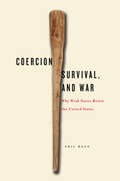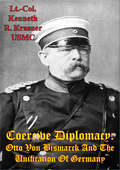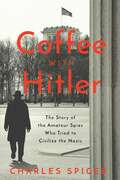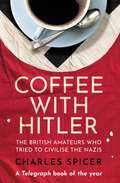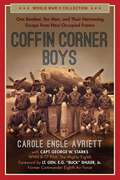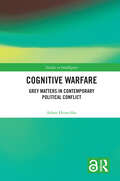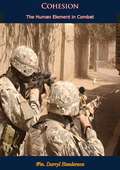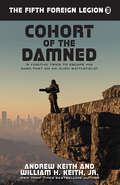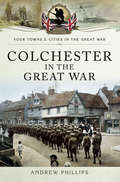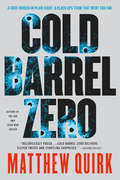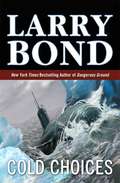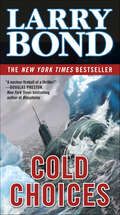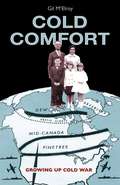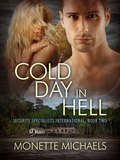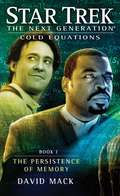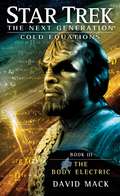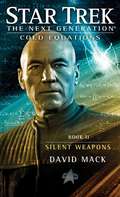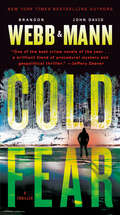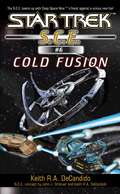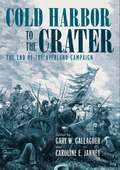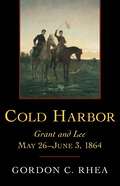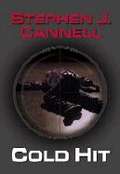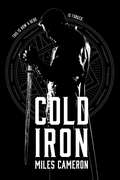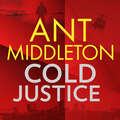- Table View
- List View
Coercion, Survival, and War: Why Weak States Resist the United States
by Phil HaunIn asymmetric interstate conflicts, great powers have the capability to coerce weak states by threatening their survival--but not vice versa. It is therefore the great power that decides whether to escalate a conflict into a crisis by adopting a coercive strategy. In practice, however, the coercive strategies of the U. S. have frequently failed. In Coercion, Survival and War Phil Haun chronicles 30 asymmetric interstate crises involving the US from 1918 to 2003. The U. S. chose coercive strategies in 23 of these cases, but coercion failed half of the time: most often because the more powerful U. S. made demands that threatened the very survival of the weak state, causing it to resist as long as it had the means to do so. It is an unfortunate paradox Haun notes that, where the U. S. may prefer brute force to coercion, these power asymmetries may well lead it to first attempt coercive strategies that are expected to fail in order to justify the war it desires. He concludes that, when coercion is preferred to brute force there are clear limits as to what can be demanded. In such cases, he suggests, U. S. policymakers can improve the chances of success by matching appropriate threats to demands, by including other great powers in the coercive process, and by reducing a weak state leader's reputational costs by giving him or her face saving options.
Coercive Diplomacy: Otto Von Bismarck And The Unification Of Germany
by Lt.-Col. Kenneth R. Krasner USMCOtto von Bismarck, Prussia's "Iron Chancellor," was arguably the dominant political figure in Europe during the nineteenth century. With acute political moves, he adroitly manipulated opportunities to achieve European hegemony for Germany and, thus, considerably altered Europe's political scene and balance of power. As the principal architect of German unification, he utilized subtle diplomacy, the formation of alliances, Prussia's formidable army, and a series of calculated--albeit limited--wars against his European neighbors to create Germany's second empire. As the archetypical statesman who espoused the power of the state in the international system, Bismarck recognized that a successful foreign policy and national strategy required the conscious integration of force and diplomacy in order to achieve his overarching goal of German unification. His political leadership thus succeeded because he understood that the use of force was a complement, and not alternative, to diplomacy. This paper examines Bismarck's manipulation of diplomatic and military instruments of national power to achieve his political goal, concluding that the fusion of force and diplomacy was the essence of Bismarck's statesmanship.
Coffee With Hitler: The Story of the Amateur Spies Who Tried to Civilize the Nazis
by Charles SpicerThe fascinating story of how an eccentric group of intelligence agents used amateur diplomacy to penetrate the Nazi high command in an effort to prevent the start of World War II."How might the British have handled Hitler differently?&” remains one of history&’s greatest "what ifs." Coffee with Hitler tells the astounding story of how a handful of amateur British intelligence agents wined, dined, and befriended the leading National Socialists between the wars. With support from royalty, aristocracy, politicians, and businessmen, they hoped to use the recently founded Anglo-German Fellowship as a vehicle to civilize and enlighten the Nazis. At the heart of the story are a pacifist Welsh historian, a World War I flying ace, and a butterfly-collecting businessman, who together offered the British government better intelligence on the horrifying rise of the Nazis than any other agents. Though they were only minor players in the terrible drama of Europe&’s descent into its second twentieth-century war, these three protagonists operated within the British Establishment. They infiltrated the Nazi high command deeper than any other spies, relaying accurate intelligence to both their government and to its anti-appeasing critics. Straddling the porous border between hard and soft diplomacy, their activities fuelled tensions between the amateur and the professional diplomats in both London and Berlin. Having established a personal rapport with President Franklin D. Roosevelt, they delivered intelligence to him directly, too, paving the way for American military support for Great Britain against the Nazi threat. The settings for their public efforts ranged from tea parties in Downing Street, banquets at London&’s best hotels, and the Coronation of George VI to coffee and cake at Hitler&’s Bavarian mountain home, champagne galas at the Berlin Olympics, and afternoon receptions at the Nuremberg Rallies. More private encounters between the elites of both powers were nurtured by shooting weekends at English country homes, whisky drinking sessions at German estates, discreet meetings in London apartments, and whispered exchanges in the corridors of embassies and foreign ministries.
Coffee with Hitler: The British Amateurs Who Tried to Civilise the Nazis
by Charles SpicerTELEGRAPH and SPECTATOR HISTORY BOOK OF THE YEAR How the British might have handled Hitler differently remains one of history&’s greatest &‘what ifs&’. Coffee with Hitler tells the astounding and poignant story, for the first time, of a handful of amateur British intelligence agents who wined, dined and befriended the leading National Socialists between the wars. With support from royalty, aristocracy, politicians and businessmen, they hoped to use the much mythologised Anglo-German Fellowship as a vehicle to civilise the Nazis. A pacifist Welsh historian, a Great War flying ace, and a butterfly-collecting businessman offered the British government better intelligence on the horrifying rise of the Nazis than anyone else. Charles Spicer draws on newly discovered primary sources, shedding light on the early career of Kim Philby, Winston Churchill&’s approach to appeasement, the US entry into the war and the Rudolf Hess affair.
Coffin Corner Boys: One Bomber, Ten Men, and Their Harrowing Escape from Nazi-Occupied France
by Carole Engle Avriett Capt. George W. StarksA story of adventure, survival, loyalty, and brotherhood... Taking off from England on March 16, 1944, young Lt. George Starks and the nine-man crew of his Flying Fortress were assigned to the "coffin corner," the most exposed position in the bomber formation headed for Germany. They never got there. Shot down over Nazi-occupied France, the airmen bailed out one by one, scattered across the countryside. Miraculously, all ten survived, but as they discarded their parachutes in the farmland of Champagne, their wartime odyssey was only beginning. Alone, with a broken foot and a 20mm shell fragment in his thigh, twenty-year-old Starks set out on an incredible 300-mile trek to Switzerland, making his way with the help of ordinary men and women who often put themselves in great danger on his behalf. Six weeks later, on the verge of giving up, Starks found himself in the hands of a heroic member of the French Resistance—he calls him "the bravest man I've ever known"—who got him safely across the heavily guarded border. Similar ordeals awaited the other nine crewmen, who faced injury, betrayal, captivity, hunger, and depression. It was nothing short of miraculous that all ten came home at the end of the war. George Starks emerged from his ordeal with two passions—to stay in touch with his crew whatever the obstacles and to return to France to find and thank the brave souls to whom he owed his life. His enduring loyalty enabled him to do both. "The story of George Starks is one that brings to life the fighting spirit, heroism, and patriotism shown by the U.S. Army Air Corps in WWII. This book is inspirational and a must-read for anyone interested in WWII history in general and the Mighty Eighth Air Force in particular." —HENRY SKIPPER, President and CEO of the National Museum of the Mighty Eighth Air Force "Rarely do we read true stories about the fearsome, persevering, enduring, unselfish love of country displayed by Dr. George Starks. He doesn't like to be called a hero, but no other word can rightly portray him better. He is my hero and after reading this book, he will be yours too." —BRENDA ELMGREN, former chief administrative of cer of the National Museum of the Mighty Eighth Air Force "...readers will catch a glimpse into rst-hand accounts of what very young men did in serving our country at a time when the world was at war—and how brave people abroad responded to their mission. You will be inspired and engrossed at every turn of the page of this remarkable book." —BILL FREDERICK, former Mayor of Orlando
Cognitive Warfare: Grey Matters in Contemporary Political Conflict (Studies in Intelligence)
by Adam HenschkeThis book explores the conceptual, historical, and ethical issues of information conflict to present a detailed analysis of cognitive warfare.Is it possible for liberal democracies to deliberately use information on civilian populations to impact political and social institutions? While information conflict has been a part of political conflict, warfare, and international relations for as long as there has been political competition, given that our modern political and social lives are saturated by information, we are now faced with a pressing set of reasons to understand cognitive warfare, and to place it in a wider historical and technological context. This book identifies a series of conceptual and ethical challenges facing liberal democracies around modern information conflict. Drawing from historical practices, it suggests that two values – human dignity and political autonomy – can explain why some acts of cognitive warfare might be judged to be good while other acts are judged to be bad.This book will be of much interest to students and researchers of intelligence studies, ethics, security studies, and International Relations.Chapters 7 and 9 of this book are freely available as a downloadable Open Access PDF at http://www.taylorfrancis.com under a Creative Commons Attribution (CC-BY) 4.0 license.
Cohesion: The Human Element in Combat
by Wm. Darryl HendersonOne of the perils for military planners in a high-tech world is to be taken in by the destructiveness of modern weapons and to give in to the currently popular theory that modern war will last for days or weeks rather than months or years—in short, to envision a world where technologies, not people, dominate war.We can ill afford to dismiss the human element in combat. The stakes are far too great. Colonel Wm. Darryl Henderson, US Army, maintains that we cannot expect tactical situations in future fields of battle to be devoid of the human factor. Most recently, for example, Iraq’s war with Iran was potentially a high-tech and swift war. That war is entering its fourth year and has cost, to date, 900,000 lives. Cohesion—mutual beliefs and needs that cause people to act as a collective whole—has so far played a more significant role in the Iran-Iraq war than all the sophisticated weapons on either side.Does American society produce the type of soldier who would, under stress, suppress his individuality and act for the mutual good of the group? In the post-Vietnam, all-volunteer force environment, the kind of American citizen attracted to military service—the qualities he carries from society and what qualities the military organization is able to impart to him—must be a matter for serious thought and planning. Colonel Henderson’s work is a step in that direction.
Cohort of the Damned (The Fifth Foreign Legion)
by William H. Keith Jr. Andrew KeithCan a man escape from his past in a fighting battalion on an alien battlefield? Wolfgang Hauser was an aristocrat—right, privileged, pampered … until the day alien invaders overwhelmed his world and stripped him of everything he held dear. Now he was an outcast, without a family or a home, his honor tainted by accusations of cowardice and murder. He was a man on the run, and sooner or later his enemies would find him and destroy what was left of his shattered life. There was only one safe haven in the far-flung Terran Commonwealth. He joined the Fifth Foreign Legion. But Wolfgang Hauser soon discovered that the Legion demanded a high price from the misfits who flocked to his banner, seeking new life and new hope. The man who had lost everything found that he would have to surrender his name, his beliefs, and his very identity to become a Legionnaire. It was a price he wasn’t sure he could pay.
Col. John Wise of England and Virginia (1617-1695): His Ancestors and Descendants
by Jennings C. WiseJennings C. Wise’s "Col. John Wise of England and Virginia (1617-1695): His Ancestors and Descendants" is an exhaustive and meticulously researched chronicle of one of colonial America’s most influential families. This comprehensive genealogy traces the life and legacy of Col. John Wise, a prominent figure whose impact spanned both England and the early Virginian colony.Wise’s narrative begins with a detailed exploration of John Wise’s English roots, delving into the familial, social, and political contexts that shaped his early life. The book vividly portrays his emigration to the New World, where he became a key player in the development of the Virginia colony. Through richly detailed accounts, Jennings C. Wise brings to life the trials, triumphs, and day-to-day experiences of Col. John Wise, illustrating his significant contributions to the colonial society and governance.As readers journey through the pages, they will encounter an extensive genealogical record that meticulously maps out the descendants of Col. John Wise. The book provides valuable insights into the family’s evolution over generations, highlighting notable figures, marriages, and historical events that influenced their fortunes. Wise’s descendants played pivotal roles in various facets of American history, and this work serves as both a tribute and a comprehensive record of their enduring legacy."Col. John Wise of England and Virginia" is more than just a genealogical study; it is a fascinating window into the early American colonial experience. Jennings C. Wise’s rigorous research and engaging prose make this book an invaluable resource for historians, genealogists, and anyone interested in the intricate tapestry of America’s founding families. Through personal anecdotes, historical documents, and insightful analysis, the book paints a vivid picture of the Wise family’s journey across centuries and continents.Whether you are a descendant of Col. John Wise, a history enthusiast, or a genealogist seeking to understand the broader context of colonial America, this book offers a compelling and richly detailed narrative. Jennings C. Wise’s dedication to preserving the history of the Wise family ensures that their legacy will continue to inspire and educate future generations.
Colchester in the Great War (Your Towns & Cities in the Great War)
by Andrew PhillipsFew towns equalled Colchester in their role in the Great War. In this expert account, Colchester historian Andrew Phillips records four of the most dramatic years in the towns history.As Headquarters of Eastern Region, Colchesters garrison supplied many of the men who prevented the early defeat of France. The town then became a training area for at least 100,000 recruits. While training, guns on the Western Front could often be heard.At times Colchesters civilian population of 40,000 was equalled by 40,000 troops, who often billeted with local families or housed in large tent cities, which then became hut cities. With 20,000 troops to feed on average, long food queues became a daily experience until rationing was introduced, and soon thousands of requisitioned horses, trucks, artillery pieces and munitions were also assembled in the town.As the war took its deadly toll, Colchester became one vast hospital as the wounded arrived by train. An enlarged garrison hospital, an enlarged civilian hospital and six Red Cross Hospitals nursed at least 110,000 men. Colchester women made huge quantities of bandages, splints and gowns to alleviate the suffering of the war wounded. Colchester factories produced uniforms, guns, shells, mines, compressors and engines. Paxmans, the largest firm of the town, produced a staggering 20 million precision-machined parts. Over 10 per cent of Colchesters adult men died in the conflict, the highest in eastern England and twice the national average. Small wonder the town built one of the finest civic war memorials in England.
Cold Barrel Zero (John Hayes Series #1)
by Matthew QuirkA CODE HIDDEN IN PLAIN SIGHT. A BLACK OPS TEAM THAT WENT TOO FAR.John Hayes is a Special Operations legend who went rogue on a deep-cover mission and betrayed his own soldiers. Disgraced and on the run, he returns to the United States to get back to his wife and daughter and take revenge on his accusers with a series of devastating attacks.Only one man can stop him: Thomas Byrne. He once fought alongside Hayes as a combat medic, but he gave up the gun. Now a surgeon, he moves from town to town, trying to forget his past, until he is called upon by a high-ranking government official to help capture the man he once called a friend.Hayes and Byrne were once as close as brothers, but with the fate of the nation hanging in the balance and nothing as it seems, both men must decide whom to trust--and whom to betray. In a final, explosive battle for justice, they face off along a rifle's cold barrel.Cold Barrel Zero brings together the blistering pace of Lee Child, the nonstop action of Brad Thor, and the richly drawn characters and moral stakes of Daniel Silva. An experienced reporter armed with deep behind-the-scenes research into America's Special Operations Forces, Quirk takes the military thriller to a new level of suspense.
Cold Choices (Jerry Mitchell #2)
by Larry BondForget everything you've ever heard about submarine novels! The sub battles in "Cold Choices" will have you biting your nails, shaking in your shoes and gasping for breath.--David Hagberg, "USA Today"-bestselling author of "Dance with the Dragon."
Cold Choices: A Jerry Mitchell Novel (A\jerry Mitchell Novel Ser. #2)
by Larry BondWhen two submarines collide in icy waters, an American navigator must find a way out of danger alive in this thriller by a New York Times bestseller.Following the events Jerry Mitchell encountered in Dangerous Ground, the pilot-turned-submarine officer is now a department head, the navigator, aboard USS Seawolf. Now on a mission deep in the Barents Sea, north of Russia, Seawolf explores the sea floor, part of a sophisticated reconnaissance plan that will watch the Russian navy as it trains for battle. Although well outside Russia’s territorial waters, Seawolf is ambushed by Russia’s newest submarine, Severodvinsk. Although it doesn’t fire any weapons, its aggressive new captain, Alexi Petrov, harasses the intruder with dangerously fast, insanely close passes by the American boat.The two subs collide, with the Russian boat crippled and trapped on the bottom. Only Seawolf knows where she is, and the rest of the Russian fleet is too angry to listen. Mitchell and his shipmates must keep their own damaged boat afloat, figure out a way to make the Russians listen, and keep the trapped Russian submariners alive until they can be saved—if that is even possible.Praise for Cold Choices“Suspenseful. . . . Its depiction of the bond shared by submariners, even those on opposing sides, makes it more intimate and, along with convincing portraits of men under severe stress, more human.” —Publishers Weekly“[An] exciting adventure. . . . The reader can practically feel the frigid water as the novel kicks into high gear. . . . Fans of military thrillers, especially those by Clancy and his ilk, should devour this one.” —Booklist
Cold Comfort
by Gil McelroyWhen his father died, award-winning poet and curator Gil McElroy was given a box of photographs that documented his father's military career. Beginning in the Second World War and continuing right through to the end of the Cold War, the senior McElroy staffed Canada's network of electronic defence, including the Distant Early Warning Line - a network of radar stations stretching along the Arctic coast from Alaska to Baffin Island. Established in the early 1950s, the DEW Line provided advance warning of an aircraft or missile attack. There, servicemen lived in isolated radar stations, watching surveillance screens for the telltale blips that threatened nuclear annihilation.McElroy reflects on the sacrifices these men made, living away from their families for great lengths of time - for the "greater good" of protecting North American airspace and Western values.At the same time, Cold Comfort follows McElroy's experience of growing up as an itinerant military brat, who moved from one posting to another, and the military family's attempts to hold together in the face of the father's absence. Cold Comfort also explores the utter enigma that was the author's father. Examining the contents of the box of photographs, image by image, McElroy attempts to come to terms with the mysterious photographer, a man better understood by his military compatriots than by his own family.Further, Cold Comfort provides the backstory to McElroy's most recent collection of poems, Ordinary Time, which offers an unsettling history of the utter failures of these remote surveillance technologies to make "our" world either better known or reliably predictable.
Cold Day in Hell (Security Specialists International #2)
by Monette Michaels"Non-stop action and wall-banging sex made it hard to put down." – Chris for Night Owl Reviews He’s a man you can rely on. She’s a woman in need of such a man … at least until she’s safely home in Chicago! Easy job, done in a day. What isn’t easy is walking away from the woman who stirs his deepest desire. When Callie’s crazed stalker tracks her down, she needs Risto’s protection once again. And this time, it will be a cold day in hell before Callie lets him go.Calista Meyers is a world-famous, soon-to-be-ex-supermodel. After arriving for a fashion shoot in Cartagena, Colombia, she realizes her agent has misled her about the nature of her last modeling assignment. Paramilitary leader Jaime Cruz paid her slimy agent a lot of money to get Callie to his part of the world. Cruz has threatened to kidnap and kill her younger brothers if she attempts to leave the country.What’s a Marine brat to do? Callie calls on her childhood friend Keely Walsh-Maddox and Keely’s husband Ren, the owner of Security Specialists International, to help her. SSI sends operative Risto Smith to rescue Callie. The former Marine has had a thing for the model ever since he’d first seen her picture on a magazine cover. But he knows he isn’t nearly good enough for a lady like her. She’s an assignment and can be nothing else.Callie knows Risto is just the man for her and decides to use the close quarters of their escape from Colombia to convince the stubborn male. When Risto leaves her in Panama and disappears, Callie is upset but not defeated. But after two months passes with no word from Risto and with her enemy Cruz in the US and back on her trail, Callie once again turns to Risto for protection.This time, it would be a cold day in hell before Callie allows Risto to turn his back on their love.Read all of Monette Michaels' series: Security Specialists International1 - Eye of the Storm1.5 - Stormy Weather Baby2 - Cold Day in Hell2.5 - Storm Front3 - Weather the Storm4 - Storm Warning 4.5 - Hot as Hell5 - An Ill WindThe Prime Chronicles1 - Prime Obsession2 - Prime Selection3 - Prime Imperative3.5 - Prime Claiming4 - Prime TargetThe Gooden and Knight Mysteries 1 - A Virtuous Vampire2 - The Deadly Séance"Readers will be swept away by the mad, bad hero Risto Smith. He is an intense character who puts as much attention into protecting Callie Meyers as he does making love to her." – Dawn Crowne, RT Book Reviews
Cold Equations: Book One (Star Trek: The Next Generation)
by David MackBook One in the New York Times bestselling trilogy set in the expanded universe of Star Trek: The Next Generation!A BRAZEN HEIST Captain Jean-Luc Picard and the Enterprise crew race to find out who has stolen Data’s android brother B-4—and for what sinister purpose. A BROKEN PROMISE One desperate father risks all for the son he abandoned forty years ago—but is he ready to pay the price for redemption? A DARING MISSION Against overwhelming odds, and with time running out, Commander Worf has only one chance to avert a disaster. But how high a price will he pay for victory?
Cold Equations: Book Three (Star Trek: The Next Generation)
by David MackBook Three in the New York Times bestselling Cold Equations trilogy set in the expanded universe of Star Trek: The Next Generation!AT THE CENTER OF THE GALAXY…A planet-sized Machine of terrifying power and unfathomable purpose hurls entire star systems into a supermassive black hole. Wesley Crusher, now a full-fledged Traveler, knows the Machine must be stopped…but he has no idea how. Wesley must enlist the aid of Captain Jean-Luc Picard and the Enterprise crew, who also fail to halt the unstoppable alien juggernaut’s destructive labors. But they soon divine the Machine’s true purpose—a purpose that threatens to exterminate all life in the Milky Way Galaxy. With time running out, Picard realizes he knows of only one person who might be able to stop the Machine in time to avert a galactic catastrophe—if only he had any idea how to find him…
Cold Equations: Book Two (Star Trek: The Next Generation #2)
by David MackBook Two in the New York Times bestselling Cold Equations trilogy set in the expanded universe of Star Trek: The Next Generation!A WAR OF LIES Three years after the disastrous final Borg Invasion, a bitter cold war against the Typhon Pact has pushed Starfleet’s resources to the breaking point. Now the rise of a dangerous new technology threatens to destroy the Federation from within. Captain Jean-Luc Picard and the Enterprise crew answer a distress call from an old friend, only to become targets in a deadly game of deception. To protect a vital diplomatic mission, they must find a way to identify the spies hiding in their midst, before it’s too late. But Worf soon realizes the crew’s every move has been predicted: Someone is using them as pawns. And the closer they get to exposing their enemy, the deeper they spiral into its trap…
Cold Fear: A Thriller (The Finn Thrillers #2)
by John David Mann Brandon WebbFinn&’s search for his memory of one fateful night leads him to Iceland—only to be followed by an unhinged assassin intent on stopping him—in the riveting follow-up to Steel Fear, from the New York Times bestselling writing team Webb & Mann, combat-decorated Navy SEAL Brandon Webb and award-winning author John David Mann.&“One of the best crime novels of the year . . . a brilliant blend of procedural mystery and geopolitical thriller.&”—Jeffery Deaver, New York Times bestselling author of Hunting TimeDisgraced Navy SEAL Finn is on the run. A wanted man since he jumped ship from the USS Abraham Lincoln, he&’s sought for questioning in connection to war crimes committed in Yemen by a rogue element in his SEAL team. But his memory of that night—as well as the true fate of his mentor and only friend, Lieutenant Kennedy—is a gaping hole.Finn learns that three members of his team have been quietly redeployed to Iceland, which is a puzzle in itself; the tiny island nation is famous for being one of the most peaceful, crime-free places on the planet.His mission is simple: track down the three corrupt SEALs and find out what really happened that night in Yemen. But two problems stand in his way. On his first night in town a young woman mysteriously drowns—and a local detective suspects Finn&’s involvement. What&’s worse, a SEAL-turned-contract-killer with skills equal to Finn&’s own has been hired to make sure he never gets the answers he&’s looking for. And he&’s followed Finn all the way to the icy north.
Cold Fusion (Star Trek: Starfleet Corps of Engineers #6)
by Keith R. DeCandidoSTARFLEET CORPS OF ENGINEERS Following the catastrophic conclusion of Avatar, Lieutenant Nog -- the chief operations officer of space station Deep Space 9 -- joins forces with the crew of the U.S.S. da Vinci! With the station's future in doubt, Nog meets the da Vinci at Empok Nor, Deep Space 9's long-abandoned twin, in order to salvage vital technology. But they arrive to find that someone has beaten them to it -- an enigmatic and dangerous alien race known as the Androssi. When the S.C.E. crew learns what the Androssi have planned for Empok Nor, it threatens not only the lives of the da Vinci and Deep Space 9 crews, but galactic peace itself!
Cold Harbor to the Crater
by Gary W. Gallagher Caroline E. JanneyBetween the end of May and the beginning of August 1864, Lt. Gen. Ulysses S. Grant and Gen. Robert E. Lee oversaw the transition between the Overland campaign--a remarkable saga of maneuvering and brutal combat--and what became a grueling siege of Petersburg that many months later compelled Confederates to abandon Richmond. Although many historians have marked Grant's crossing of the James River on June 12-15 as the close of the Overland campaign, this volume interprets the fighting from Cold Harbor on June 1-3 through the battle of the Crater on July 30 as the last phase of an operation that could have ended without a prolonged siege. The contributors assess the campaign from a variety of perspectives, examining strategy and tactics, the performances of key commanders on each side, the centrality of field fortifications, political repercussions in the United States and the Confederacy, the experiences of civilians caught in the path of the armies, and how the famous battle of the Crater has resonated in historical memory. As a group, the essays highlight the important connections between the home front and the battlefield, showing some of the ways in which military and nonmilitary affairs played off and influenced one another.Contributors include Keith S. Bohannon, Stephen Cushman, M. Keith Harris, Robert E. L. Krick, Kevin M. Levin, Kathryn Shively Meier, Gordon C. Rhea, and Joan Waugh.
Cold Harbor: Grant and Lee, May 26–June 3, 1864
by Gordon C. RheaGordon Rhea's gripping fourth volume on the spring 1864 campaign-which pitted Ulysses S. Grant against Robert E. Lee for the first time in the Civil War-vividly re-creates the battles and maneuvers from the stalemate on the North Anna River through the Cold Harbor offensive. Cold Harbor: Grant and Lee, May 26-June 3, 1864 showcases Rhea's tenacious research which elicits stunning new facts from the records of a phase oddly ignored or mythologized by historians. In clear and profuse tactical detail, Rhea tracks the remarkable events of those nine days, giving a surprising new interpretation of the famous battle that left seven thousand Union casualties and only fifteen hundred Confederate dead or wounded. Here, Grant is not a callous butcher, and Lee does not wage a perfect fight. Within the pages of Cold Harbor, Rhea separates fact from fiction in a charged, evocative narrative. He leaves readers under a moonless sky, with Grant pondering the eastward course of the James River fifteen miles south of the encamped armies.
Cold Hit (Shane Scully #5)
by Stephen J. CannellStartling connections between a 10-year-old cold case and a string of brutal killings lead Detective Shane Scully to a sinister government conspiracy in this latest thriller. Every two weeks, a serial killer beats then shoots Vietnam vets in the back of the head, tossing their bodies in the river. Into this explosive mix comes another killing that Shane believes is a copycat. After FBI agents throw him off the case, Shane and his wife go outside the law and deep undercover to unravel a murderous plot with criminal connections high up the ladder of political power.
Cold Iron (Masters & Mages #1)
by Miles CameronA young mage-in-training takes up the sword and is unwittingly pulled into a violent political upheaval, in the first book of this epic fantasy trilogy by Miles Cameron, author of The Red Knight.Aranthur is a promising young mage. But the world is not safe and after a confrontation leaves him no choice but to display his skill with a blade, Aranthur is instructed to train under a renowned Master of Swords.During his intensive training he begins to question the bloody life he's chosen. And while studying under the Master, he finds himself thrown into the middle of a political revolt that will impact everyone he's come to know.To protect his friends, Arnathur will be forced to decide if he can truly follow the Master of Swords into a life of violence and cold-hearted commitment to the blade.Masters & MagesCold IronFor more from Miles Cameron, check out:The Traitor Son CycleThe Red KnightThe Fell SwordThe Dread WyrmThe Plague of SwordsThe Fall of Dragons
Cold Justice: The Sunday Times bestselling thriller (Mallory)
by Ant MiddletonIt's here: the landmark debut thriller from superstar Ant Middleton, million-selling, number one Sunday Times author of First Man In and The Fear Bubble and star of SAS: Who Dares Wins.This is a full-cast, unabridged audio production starring Ant Middleton, Steven Mackintosh and a full cast of actors.Mallory - he was the best of the best, a Special Forces leader and a hero. But then he made a fatal decision, gambling with the lives of his men with terrible consequences: two dead, and his young friend Donno left in a coma. Back on the streets, with nothing to lose, Mallory has a darkness growing inside him, a dangerous need to seek out trouble. Then Donno's mother asks him for help: her other son, Scott, has gone missing in South Africa, and she wants Mallory to find him.Perhaps it's redemption, perhaps he's looking for revenge on the world, but suddenly Mallory has a purpose, and nothing and no one is going to stand in his way.A THRILLER SO REAL IT HURTS. The complete cast list is: Ant MiddletonSteven MackintoshChristopher BonwellJon CartwrightJohn ChancerBen CutlerMichelene HeineDavid JohnWill KellyDiana KentAndrew LoudonAlexander MushorePeter NobleLaila PyneHomer Todiwala
